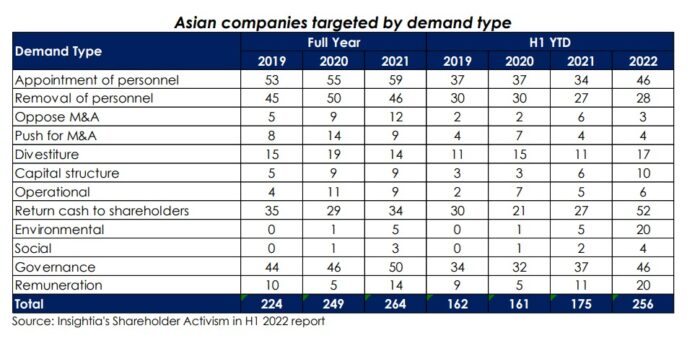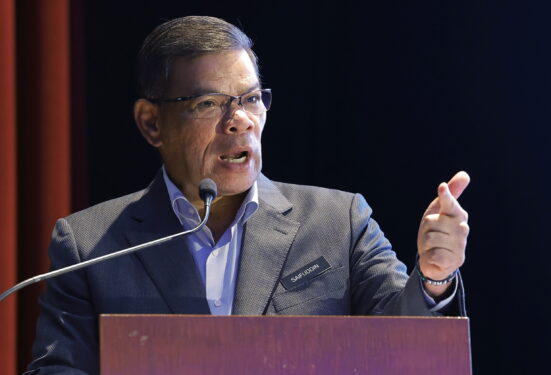COMMONLY associated with companies in the West, shareholder activism is gradually gaining traction in other jurisdictions, especially in Asia.
Often seen as a relative backwater for shareholder activism, Asian companies have not faced the same level of activism that Western companies have been accustomed to.
However, the region is becoming a breeding ground for activist shareholders as the latter seek more opportunities beyond their traditional stronghold in the West.
Furthermore, the rise of shareholder activism in the East is also fuelled by growing focus and heightening scrutiny on corporate governance and transparency from the investing public.
According to figures from Insightia – a data provider on shareholder activism, shareholder voting and corporate governance – the number of US companies subjected to activist demands has been falling since 2016 from 662 companies to a new low of 461 companies in 2021.
Meanwhile, the number of Asian companies subjected to activist campaigns rose from 95 in 2016 to 134 in 2021. The Asian continent has gone from representing 7.3% of global activist targets in 2015 through consecutive increases to 14.5% in 2021.
Booming demands from activists
Shareholder activism is back on the upswing in the aftermath of the COVID-19 pandemic.
Notably, the scale of activists’ campaigns reached a new height in 1H 2022 with the number of Asian companies subjected to activists’ demands increasing by 34% to 126 from 94 companies in the previous corresponding period, according to the Insightia’s Shareholder Activism in 1H 2022 report.
In contrast, the number of US companies targeted by activists merely grew 7.4% to 390 in 1H 2022 from 363 in the year before.

Over the six-month period, activist shareholders have made 256 demands to Asia-based investee companies. The report showed that most of the demands revolved around the appointment and removal of personnel (28.9%), environmental, social and governance (ESG, 27.34%) and return of cash to shareholders (20.3%).
Sector-wise, companies from the industrial, consumer cyclical and technology industries were subjected to activists demands the most with 25%, 18% and 17% of total companies involved.
Japan and South Korea continued to top the chart of shareholder activism in Asia by making up more than half of the activist campaigns launched.
Shareholders’ concern shift to ESG
On the other hand, we have seen the ESG agenda which has quickly risen in activists’ priorities when launching their campaigns against Asian companies.
There is an apparent shift in shareholder activism towards ESG in 2022 (refer to table below). Across Asia, the number of corporate actions related to ESG has grown by circa 60% in 1H 2022 from 44 in the previous period.
Above all, the number of ESG proposals (70) targeted at Asia-based companies in the first six months of 2022 alone has surpassed the total ESG proposals (58) tabled in 2021.
Governance continues to be a central issue with board oversight on ESG matters being increasingly important to investors, notably heightened interest in specific themes related to climate risk oversight and board composition.
Year-to-date, the focuses of activist shareholders in 2022 were highly concentrated on the environmental and governance aspects of the ESG agenda/framework.
Of the 22 Asian companies that were subjected to environmental proposals in 1H 2022, a majority (18) of them were subjected to demands related to climate change and greenhouse gas (GHG) emissions.
Activist shareholders would push their agenda by requesting companies to either amend a policy, provide information, or address a concern relating to climate change and GHG emissions.
On top of that, activists had levelled governance-related demands at 68 companies with most of them related to the amendment of company policy (24), disclosure of information (19), change of board composition (eight) and board independence (seven).
Some of the requests made by activists in making their governance-related claims are:
- Call for amendment or repeal of bylaw/policy relating to a company’s corporate governance;
- Call for re-configuration of boardroom structure, usually by appointing more independent directors;
- Calls for greater transparency or for the company to clarify certain information, usually regarding the company’s books and records, or the results of investigations.
Driving change from the bottom up
Minority shareholders are often seen in a vulnerable position by virtue of their minority interest in a company.
Under the majority rule principle, minority shareholders do not have sufficient voting power to exert their control over a company nor cast a significant influence over the direction of a company.
However, gone are the days when minority shareholders passively wait for boards and managements to make the change at the top. Given the global backdrop of rising shareholder activism, minority shareholders, too, could make changes in companies’ policy and management by making their concerns and displeasures known. – July 31, 2022
Devanesan Evanson is CEO of the Minority Shareholders Watch Group (MSWG).
The views expressed are solely of the author and do not necessarily reflect those of Focus Malaysia.











